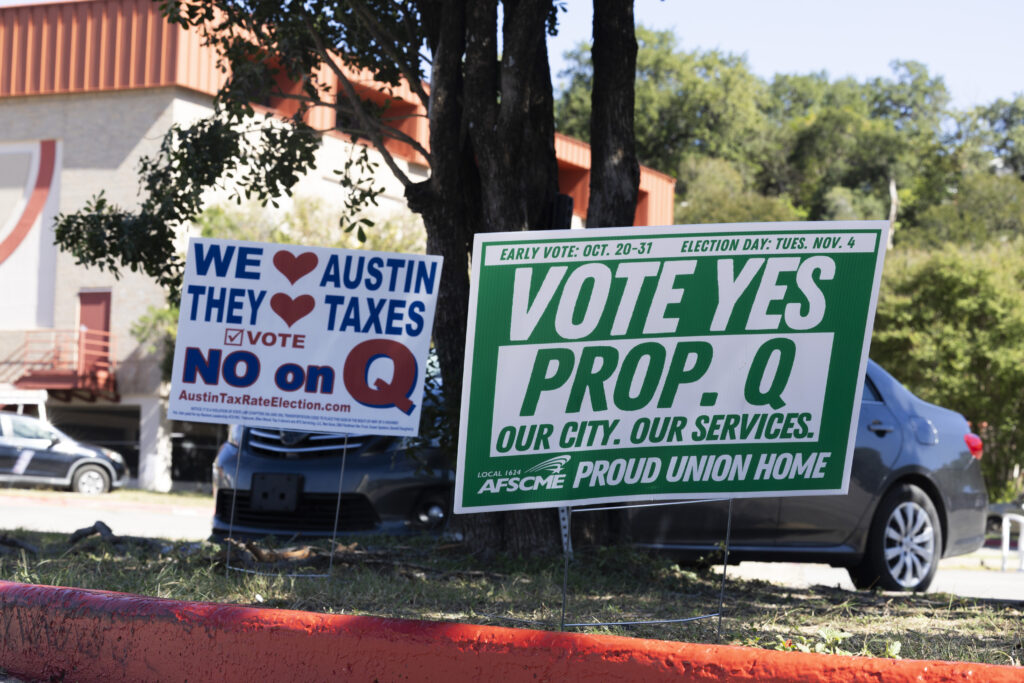In August, the Austin City Council passed a $6.3 billion budget, which is contingent on a controversial 20% property tax increase that’s pending voter approval: Proposition Q on the November ballot.
Houston is also facing budget problems, but Mayor John Whitmire has been on a no-new-taxes crusade.
Chaya Tong, who reports for Austin American-Statesman, said both Austin and Houston are big liberal cities that are facing restraints based on the property tax limit passed by the state Legislature in 2019.
“[The limit] says that local entities have to put tax rate increases to a vote if they are more than 3.5%,” she said. “And we’re seeing that come into play this year, kind of for the first time really in Texas, now that COVID relief money is drying up and local governments are looking for how they’re going to get their next influx of spending.”
According to Tong, Houston has a $330 million budget shortfall. Meanwhile, Austin is hoping to add more city services through Proposition Q without pulling from reserves or going into what had originally been projected as a $33.4 million deficit.
“Whitmire became Houston’s mayor in January of 2024. And when he inherited Houston, he inherited it with a $330 million budget shortfall. And he’s been taking steps to resolve that without raising taxes,” Tong said. “He has gone for this big efficiency study, which has identified $122 million in potential savings. And so the big question for Houston is whether that efficiency study and other cuts that they’ve made will be enough to save the city from that deficit.”
» GET MORE NEWS FROM AROUND THE STATE: Sign up for Texas Standard’s weekly newsletters
Tong said this approach is not without its own risks.
“Analysts from the outside are warning that perhaps without the new revenue coming in from taxes, Houston could be plunged into an even deeper deficit, but that remains to be seen,” she said. “[But Whitmire] has implemented things like voluntary buyouts or hiring freezes that have just tightened the city’s budget to its max before he then maybe possibly in the future would go to voters for a tax raise.”
Austin’s Prop Q would increase the budget for city services, especially for homelessness, parks and recreation and public safety.
“What Prop Q does is that it raises about $110 million for the city government towards specific causes, and in the future that would go into the general fund for services that Austinites seem to have prioritized.” Tong said. “And what we’ll find out soon – it’s early voting right now – is whether Austin values those services enough to raise property taxes for them.”
Prop Q has been the subject of backlash, especially because Austin has been faced with questions of affordability recently.
“People have definitely been upset for a long time about the city’s spending,” Tong said. “Whether that’s on homelessness, whether that’s a $1 million logo rebrand, or discretionary spending that we reported on with taxpayer money that city leaders have used on things like working lunches, even during Austin’s financial crunch.”
Tong said that both cities are trying to solve similar problems in very different ways, and it remains to be seen which will be more successful.
“We see cities that are fighting to hold on to public trust, especially during this time during economic downturn, but also hang on to the quality of life that citizens are used to and expect,” she said. “One took a more financially conservative route, one took financially progressive route, and the question for both now is which approach is going to hold out better in the long run.”

